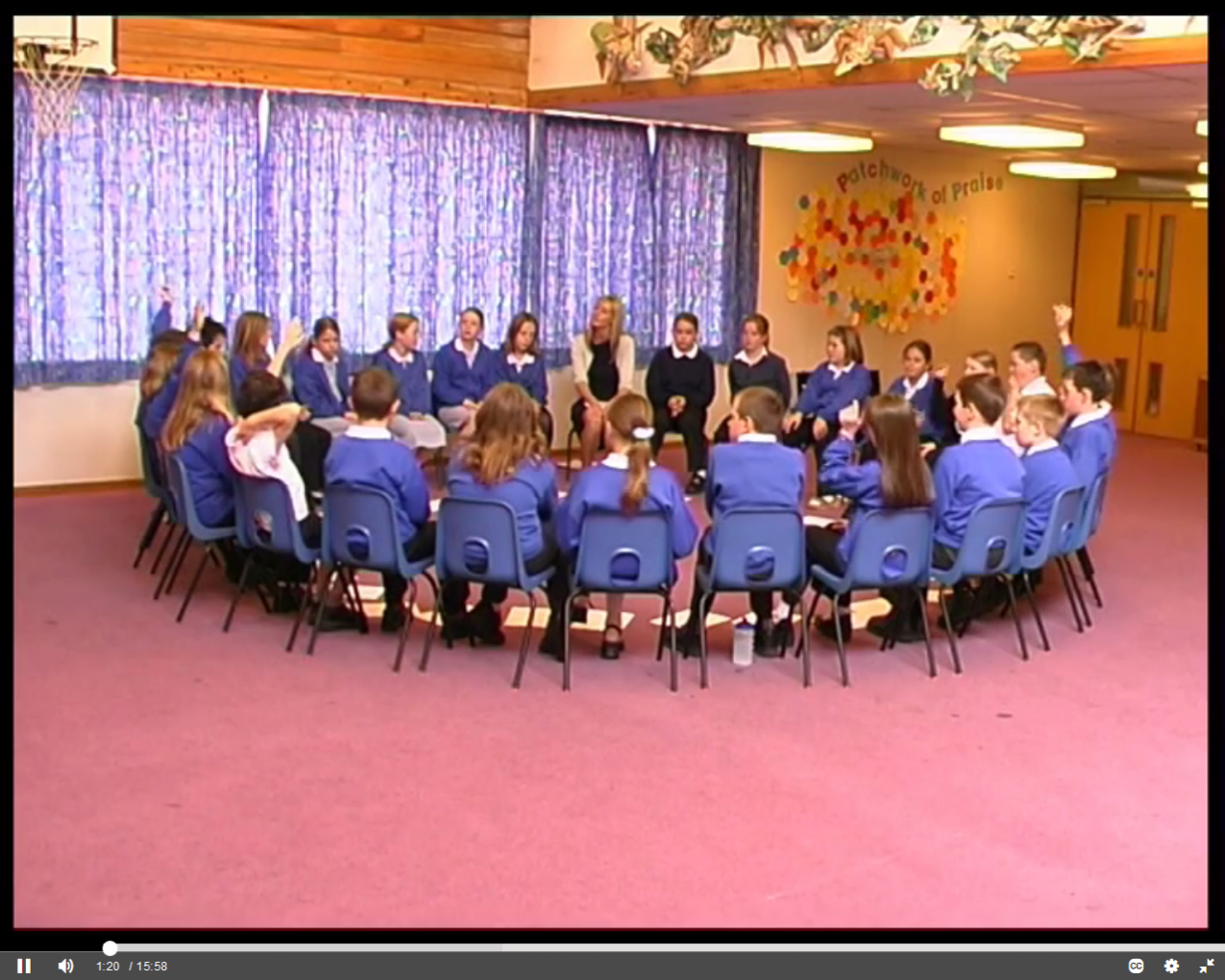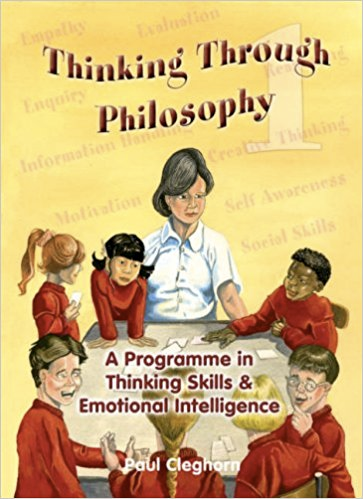
April 25, 2018, by Rupert Knight
Why Philosophy with children?
In this post, Sally Betteridge considers the benefits of doing Philosophy with children and shares her experiences.
Is it a ‘nice’ added extra or an essential part of children’s education?
Children taking part in Philosophy lessons has been an area of discussion for many years. With an already very busy Primary curriculum it’s not surprising that it is something that gets overlooked and as it is not a compulsory National Curriculum subject, it may be viewed as not important or worthwhile. However, research from the likes of Robin Alexander and Neil Mercer and going back to Lev Vygotsky shows the strong link between between spoken language, learning and cognitive development, as in this paper by Lyn Dawes and Claire Sams, for example.
There is much research indicating that children who take part in regular Philosophy sessions benefit in a number of ways:
-
The use of dialogue and the open ended creative nature of Philosophy sessions increases cognitive ability
-
Because of the open-ended themes for discussion and the aim of listening to others and building empathy, it enhances mental health and wellbeing and increases confidence, self-esteem, reflection and feelings of inclusion
-
Social skills are also developed as an emphasis is put on listening and speaking skills, and being able to disagree respectfully
-
Critical thinking skills are developed as well as children’s ability to be creative and imagine possibilities. It allows them to become field independent and spontaneously adaptive
-
It creates a safe space to discuss challenging issues, which might not ever be discussed elsewhere, allowing children to understand that people’s opinions can differ from their own and that it is OK to change your mind about things.
Research at Durham University found some promising effects in developing these skills using Philosophy.
In the 21st Century, creativity in both thinking and learning is now firmly established as a necessary skill for life and is essential to be successful within a rapidly changing world. As well as this, much research shows that creative development is linked to a wider enjoyment of school. If children enjoy school more and link learning to enjoyment then they are more likely to be successful. When taking part in Philosophy, children are developing these essential critical thinking skills and learning how to negotiate and adapt and be creative with their ideas. They are also learning to question the world. A Philosophy session once a week that feeds in to the rest of the children’s learning could be said to be laying the foundations for learning, to enable them to learn about learning and to develop the characteristics of creativity. Through Philosophy, they learn to really comprehend and use these comprehension skills for a purpose, to problem solve, to look for alternatives when working through a problem and to question truths, to name but a few – all of the skills needed to be a successful learner in any subject.
From my own experience of doing a weekly Philosophy session with my class, I found that it was so much more than a one-hour session a week. In my opinion, it was the most important hour that I did. It established the working ethos in my classroom and built respect and rapport. The children were understanding of each other and each other’s differences and needs. They learned that their classmates and I were interested in what they had to say. Everyone was on a level playing field as we didn’t need any specific knowledge to be involved and to be successful. The children began to self-regulate their behaviour and any problems they had in the classroom as we had a shared understanding. They could often sort their social problems out between themselves by entering in to a shared dialogue. The behaviour for learning in the classroom was set and the way we established our community of inquiry in our Philosophy time permeated throughout the rest of the week. The thinking skills they developed were utilised in every other subject. So I believe that it was the most important hour of my week. At the start of this film is a brief example of one of my philosophy discussions.
When the children were interviewed about their Philosophy sessions, as part of an inquiry project, they commented that:
-
It allowed them to really think and have lots of ideas
-
It gave them time to actually think rather than being rushed
-
It allowed them to understand the people in their class better
-
The focussing exercise allowed them to relax and focus and they used the focussing exercise in other areas of their life, such as when they argued with their sibling at home or when they were faced with a challenge.
Developing children’s personal and social skills and building their self-esteem and enhancing their knowledge of life and the world around them is essential for their learning power and for success in life; Philosophy is a very valuable way of developing all of these skills.
I followed the Thinking through Philosophy programme devised by Paul Cleghorn when I first began and then, as I developed as a facilitator of the sessions, I developed my own materials and ways of working.

In a lesson on the theme of beauty observed in an Ofsted inspection, the children were able to discuss complex issues on a story that was used as the ‘stimulus’:
The teacher immediately captured pupils’ attention by an effective calming exercise to ensure that all were concentrating fully on the events in the classroom. When the mood was perfect, the teacher moved quietly on to a sensitive reading of ‘The Butterfly’. This clearly had an inspirational impact on the pupils who sat totally still, transfixed by the story. The teacher then teased out of pupils their interpretation of a complex tale of happiness lost and found. They started uncertainly but the teacher gave them such confidence that before long all were keen to contribute. They spoke eloquently about the meaning of beauty, how different people see it and how they find it. One pupil explained, you can’t just find happiness you have to create it. It’s like when I spend time with my family at weekends – it’s a special time for me. By now, the teacher’s work was largely done. Pupils listened respectfully to the views of others and responded with “I agree but…” or “I disagree because…”. In this way, they delved even more deeply into the story and were soon debating how the author had ‘hidden’ symbols of beauty in the text. It was a remarkable lesson that got the very best out of the pupils.
(Taken from the Ofsted report)
In this inspection it was stated that,
“The introduction of ‘Philosophy for Children’ has provided excellent opportunities for pupils to develop an understanding of citizenship and explore the relationship between man and society. These lessons, focusing on giving pupils the skills and confidence to think deeply about issues, are having a very good effect on pupils’ discussion in all lessons and have quickly become an important aspect of the curriculum.”
So, if these are the skills that we want to develop in young people and these are the skills that employers are looking for and skills that are needed to be successful in a rapidly changing world, it seems a sensible way forward for children to be taking part in lessons where these skills are developed.
What are your thoughts? We would love to hear them:
-
Do you do Philosophy in your classroom and, if so, what is the impact?
-
Would you like to do Philosophy but time is an issue?
-
Have you done Philosophy in the past but have stopped? What were the reasons for this?
No comments yet, fill out a comment to be the first

Leave a Reply